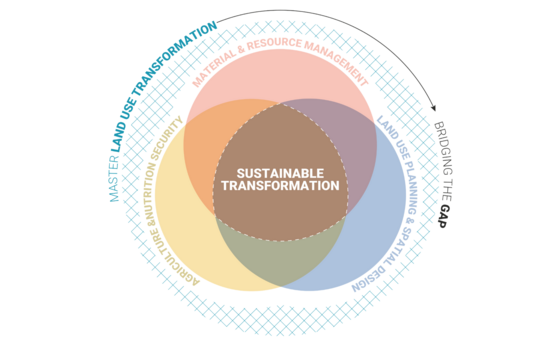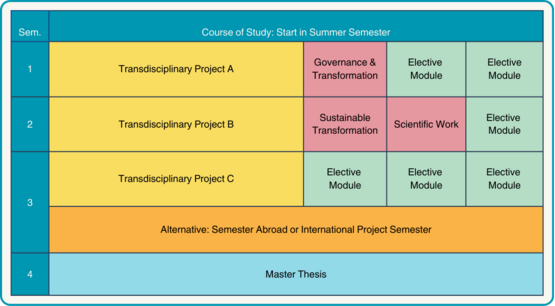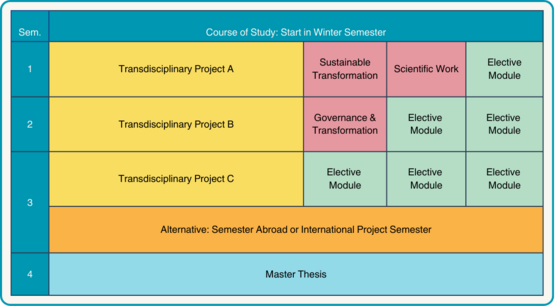Land Use Transformation (M.Sc.)
Program structure
Structure of the Master's program
The Master's program Land Use Transformation lasts 4 semesters. To complete their degree on time, students need to earn 30 ECTS credit points each semester. Most modules are worth 5 ECTS credit points, the Transdisciplinary Projects in this program are each worth 15 ECTS credit points, and the Master's thesis is worth 30 ECTS credits. You'll find more details on these components of the degree program below.
There are two study plans for the program, depending on which semester you begin your studies:
Components of our curriculum
In the standard course of study, the first three semesters each include a Transdisciplinary Project module, worth 15 ECTS points. Each semester students can choose one of two project topics, which center real-world problems and practical issues relating to sustainable land use. Example topics include:
- Resilient Landscapes - evaluating different forms of land use to optimize resilience, soil health and biodiversity
- Life Cycle Assessment - mapping the life cycle efficiency and envorinmental impact of products and/or value chains
- Communicating at the Nexus - what potential conflicts arise in communication at the interface between land planners and land users, like farmers, and what strategies can help foster understanding and trust
Students work together across disciplines and semesters to understand the challanges at the heart of the project and to develop, test, and evaluate potential solution strategies. Each student group presents their results with a scientific poster and reflects on all the semester's findings in a conference-style forum.
In addition to generating knowledge around their specific case, students gain hands-on experience developing and evaluating multi-benefit strategies for the sustainable land transition, as well as learning and practicing highly transferable project managment and communication skills.
Our curriculum includes three core required modules:
-
Sustainable Transformation - This lecture series is designed to provide orientation in the topics of the curriculum. It addresses the main trends and crises in the Anthropocene, overviews transformation strategies for sustainable land use and introduces important governance structures from the local to global scale. Lectures are accompanied by group work and discussions.
-
Scientific Work - This module is designed to ensure that students from various undergraduate disciplines share an understanding of the scientific method, how to apply it and how to evaluate the merit of scientific works. They also learn to communicate the results of their scientific work effectively and professionally.
-
Governance and Transformation - This seminar explores the development, definition and implementation of goals and policies surrounding climate change mitigation and land use. It is designed to help students cultivates a deeper understanding of the central players involved, the political economy logics of decision-making processes, as well as the drivers and conditions of transformation.
Our curriculum offers students the freedom to chart their own course, according to their individual interests and experience. Students develop their personal expertise by choosing six elective modules, each worth 5 ECTS credit points, from our catalog of 28 electives. The topic areas and intersections at the heart of our curriculum are depicted here:

Students can choose to spend their third semester abroad. There are two options available:
- Semester abroad - During a semester abroad, you need to earn 25 ECTS credit points through Master's modules at an accredited univerisity abroad, such as one of our many partner universities. You are free to choose any Master's modules on offer that complement the curriculum of the degree program Land Use Transformation. In addition, you will complete the module 'Project Abroad' at Osnabrück University of Applied Sciences, which is a small-scale, individual project designed to help you reflect on your experiences and the impacts of the cultural context on approaches to sustainable land use.
- International Project Semester - Alternatively, you can complete a large-scale, 6-month-long project at an accredited university abroad (research approach) or at a company or organization abroad (transfer approach) and have it credited with 30 ECTS points based on the number of hours worked. The project task and topic are decided between the student, the advisor at home and the project supervisor abroad. This option allows you to gain lots of experience relevant to your future career, but it also requires outstanding initiative and self-organization - perfect for go-getters with vision.
The degree program Land Use Transformation culminates in the Master's thesis, worth 30 ECTS credit points.
By working independently on a unique scientific task and presenting the results in writing and orally, students demonstrate that they have achieved the educational objectives of the study program. During the thesis semester, they:
- formulate and research their project topic,
- create a project timline and manage their independent work,
- apply the theoretical and practical knowledge, understanding and skills they have aquired through their studies to their chosen topic,
- develop solutions to problems within the framework of their research or application-oriented project, and
- present their results in professional forum.
In addition to completing the written Master's thesis (approx. 60-90 pages, depending on the subject), students attend a scientific colloquium to demonstrate their ability to engage in scientific discourse.

